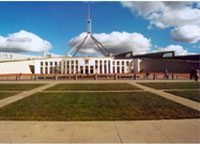Politics - POLSB14054
Stream Summary
Faculty: ARTSC - Faculty of Arts&Social Science
School: School of Social Sciences
Contact: School of Social Sciences
Program: 4054 - Arts / Education (Secondary)
Award(s):
Bachelor of Arts (Major)
View stream information for previous years
Stream Outline
Politics is an integral part of human civilisation. The systematic study of politics has been conducted for some 2,500 years, since the ancient Greeks. It thus predates the other social sciences – economics, sociology, anthropology, and psychology – by a few millennia. Aristotle called politics the “master science”, because unless people could live together and flourish all other human pursuits were futile. Politics at UNSW involves the study of governments, political systems, processes and behaviour, public policies, the basis of political relationships such as political authority and political obligation; political values such as liberty, equality, and justice; and normative questions of how human beings should live together. A major stream in Politics thus treats many of the headline issues and big questions governments, societies, and citizens face. The Politics major stream is closely connected to International Relations (itself a field of Politics), as well as to the disciplines of Sociology, Economics, History, Philosophy, and Law. UNSW has research strengths in the disciplinary fields of Australian Politics, Comparative/World Politics, and Political Theory.
Students graduating from UNSW with a major stream in Politics should be able to demonstrate:
- an ability to place questions of political order, political values, and political decision-making at the centre of analysis
- a knowledge of the key concepts, main approaches and alternative methods employed in the study of politics
- an understanding of what political knowledge is and how it is acquired
- an appreciation of the contested nature and the problematic character of political inquiry
- respond to a piece of writing on Politics, identifying its strengths and weaknesses;
- distinguish among theoretical, conceptual, and empirical lines of enquiry;
- contribute to the discussion of political and ethical issues in a reasoned manner;
- undertake research, using both traditional, and technological sources;
- communicate ideas fluently, develop a reasoned argument, synthesise relevant information and exercise critical judgement;
- write in a style used within this discipline;
- reflect on their own learning and seek to make use of constructive feedback.
| A student who wishes to do a major stream in Politics and a major stream in International Relations, or a major stream in one and a minor stream in the other will be required to complete 18 uoc at level 1 in ARTS1840 Australian Politics: Intro, ARTS1810 Intro to IR and ARTS1811 Contemporary Issues in IR and another 6 uoc at level 1 from a ‘related’ course approved by the course coordinator. |
Stream Structure
- ARTS3368 Social & Political Philosophy (6 UOC)
- ARTS3783 Great and Emerging Powers (6 UOC)
- ARTS3788 European Governance (6 UOC)
- ARTS3812 Theorising IPE (6 UOC)
- ARTS3814 Australian Foreign Policy (6 UOC)
- ARTS3816 US, China and Intl Law (6 UOC)
- ARTS3817 The Middle East (6 UOC)
- ARTS3819 Emerging Security Challenges (6 UOC)
- ARTS3841 Politics Capstone (6 UOC)









